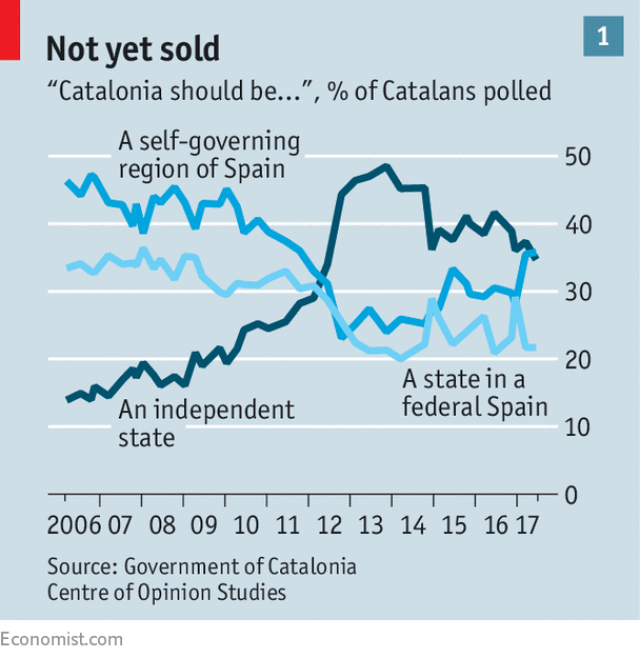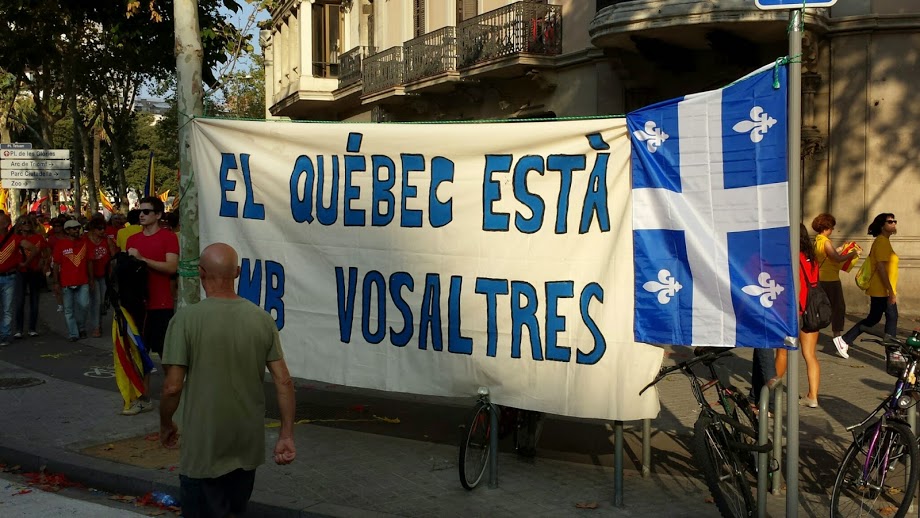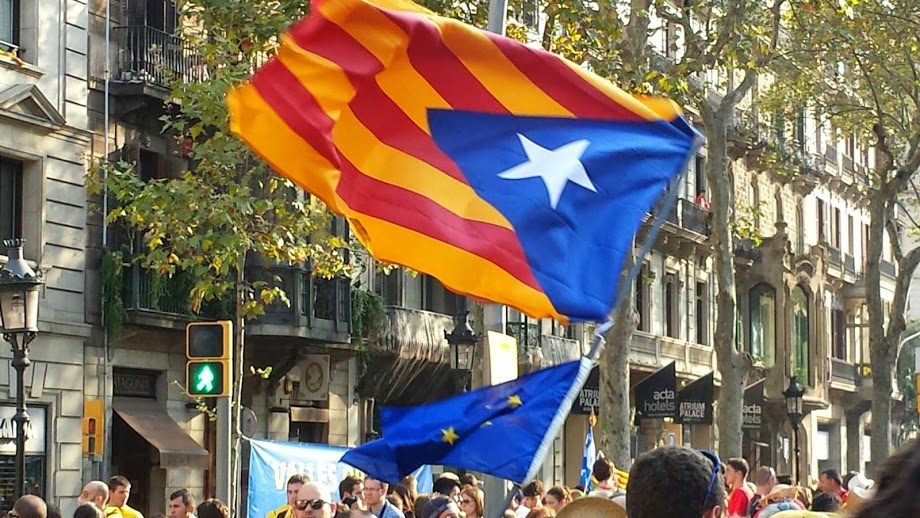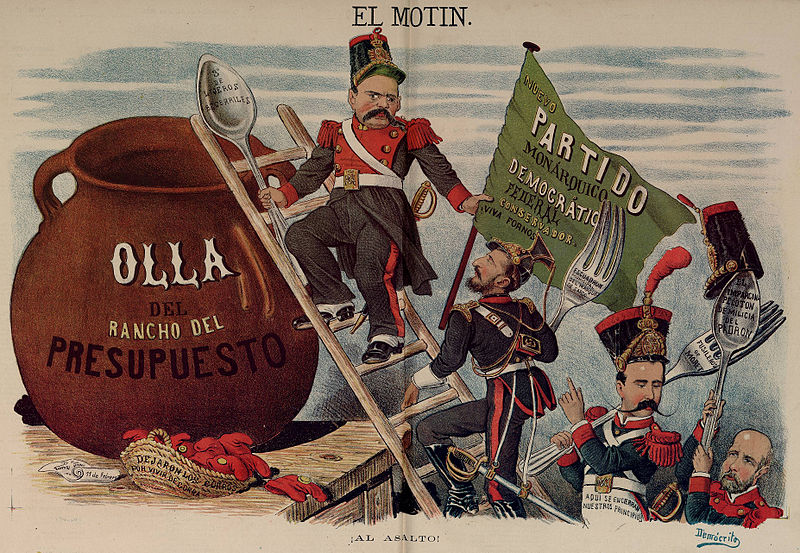The Catalan government is set to hold a referendum on independence on October 1st and tensions are mounting. I’ve been living here since early 2011 and enjoying every moment. I tried to ignore the recent events, but the noise coming from the chopper is a constant reminder of the political tensions.
Living here for quite some time also means I have some opinions which I share in conversations. So, let me try to lay them out in a Q&A format.
The most important part begins with “What would my solution be?”. But here goes, from the start:
What led to the current clash?
2006: I won’t go into centuries of history, but just one decade back. In 2006, the Spanish and Catalan governments (both led by the center-left socialists) reached a deal on an expansion of the autonomy known as the Estatut. A referendum held in Catalonia resulted in a massive 78% approving the agreement that expanded fiscal autonomy and also described Catalonia as a nation.
2010: The center-right PP appealed to the Constitutional Court and in 2010, the court stripped out major parts of the Estatut as unconstitutional. This was the turning point: a million people came out to protest in Barcelona, just one day before Spain won the world cup.
2011: The center-right PP won power late in 2011 amid a second recession. These joined the grievances from 2010 and the PP contributed to growing demands for independence. PM Zapatero’s smoother tone was replaced by disrespect by the PP and PM Rajoy.
2012: A massive pro-independence rally on Catalonia’s National Day, September 11th, marked the beginning of the current struggle. One of the grievances that year came from Spain’s education minister at the time. He wanted to “Hispanicize” Catalan children.
This is when the call for independence gained pace, as you can see in the chart below. Note that the secession had under 20% before the Estatut was rejected by the court.

2014: Catalan President Artur Mas led a “consultation” on November 9th (N-9), that was deemed illegal, thus becoming a messy affair. It resulted in 80% voting for independence, but with a very low turnout.
2015: Pro-independence parties gained a majority in the Catalan parliament (72 / 135 seats) but only 48% of the popular vote. Similar to the N-9 vote, it can be interpreted both ways.
2017: The Catalan government announced its intention to hold a referendum on October 1st back in June. The Catalan Parliament passed the referendum law in an accelerated process that triggered an abandonment of the chamber by the opposition. The Constitutional Court struck it down the following day. On September 20th, the Spanish Guardia Civil made 40 raids and 14 arrests, trying to stop the vote. Protests broke out and Spain sent reinforcements. The authorities also shut down websites related to the referendum and also websites of political movements such as the ANC. The General Attorney is trying to put the autonomous police, Mossos d’Esquadra, under a united police force. The latter were ordered to seal all potential voting places and they are stuck in the middle.
What are Catalans’ main grievances?
Respect
Respect: The current government is tougher on Catalonia. The aforementioned attacks on the Catalan language, an attempt to frame Catalan politicians, the government that rejects any attempts to talk and the right-wing media that bashes Catalans. For example, a Spanish television show presented the following question on the website of dating show: “If you had a child, would you prefer him to be gay, black or Catalan?”.
Is this grievance justified?
I see most of them as justified, especially regarding the referendum. Repeating that the referendum is unconstitutional is true, but also an insult to intelligence. The constitution was swiftly amended in 2011. When there’s a will, there’s a way. But there’s no will.
It is a political problem, not a legal one.
However, some of the anti-Catalan sentiment gets overexposure to stir sentiment. A few years ago, a retired general from Franco’s days said that “Catalan independence? On my dead body”. The fact that he was old and retired for quite some time was somewhat obscured. Fascists still exist in Spain, but they do not get the winks that Trump gave white supremacists in the US.
In addition, there is also some anti-Spanish rhetoric here and this was exploited by the PP recently:
The clip cherry picks anti-Spanish sentiment among high-ranking Catalan officials.
But all in all, opening the door to dialogue would go a long way to calm tensions. A late attempt was recently made by Spain’s finance minister Luis de Guindos, saying “we can talk about money” once the referendum is cancelled. A “let’s talk” should have been heard years ago.
So let’s talk about money.
Money
Catalonia is a rich region: around 15% of the population creates some 20% of GDP. Catalonia subsidizes other regions and this is a source of grievance.
Some reject any subsidy altogether. The Basque Country and Navarra collect their own taxes and only pay the central government for the services they get. This means no solidarity.
Some accept redistribution but feel that Catalonia not only pays more than others but also gets less: a model that is more skewed than New York subsidizing Alabama, Bavaria subsidizing East Germany, London subsidizing the North, etc.
Is this grievance justified?
Here my answer is mixed. The Spanish government should have invested more in expanding the seaport, making the airport a bigger hub, constructing a high-speed train from Barcelona (city No. 2 in Spain) to Valencia (No. 3) and just having the Mediterranean Corridor go through the Mediterranean Coast. Despite all the decentralization, everything seems to go through Madrid.
Schools reportedly get fewer resources than those in Andalucia. I haven’t verified that. Yet the complaints about the toll roads are just wrong. Contrary to what some think, there are toll roads in other parts of Spain. And who is responsible for pricey driving in Catalonia? The Catalan government, which cozies up to toll road operators.
And regarding that fiscal deficit, the answer is mixed as well: Catalonia undoubtedly pays more and gets less, but the estimations vary. For example the estimations for 2012 range between 10 to 14.6 billion euros. This is another source of disagreement.
What would my solution be?
In one word: Scotland.
I could also add Quebec. It doesn’t matter if Scotland was a nation or what happened in 1234. There is clearly a desire for a vote: 70-80% support a referendum. In my opinion, people should have the right to self-determination. This applies to my Jewish people, to the Palestinians, to the Scots, and to the Catalans.
Spain should change the constitution and agree on a timeline for a referendum, just like in Scotland. An agreed poll would calm tensions and would open a real debate on the real issues. So far, there is no real discussion on what the implications are.
In Scotland, there was time (18 months) to have a serious, open debate on many issues regarding Scottish independence. It wasn’t all-encompassing nor clean of manipulations, but certainly much better than here.

What would be the result of an agreed referendum?
Probably the same as in Scotland: a majority against independence. That’s what the polls show: 49% against and 41% in favor according to the latest numbers. The latest tensions could push more people to independence but once things calm down, it could follow the Scottish path as well.
Up there, the Conservative Government led by David Cameron offered the carrot and the stick. They promised Scotland more funds and perhaps further autonomy if they stay. And they also vowed to be tough on the Scots if they leave. Major corporations joined in by threatening to leave Scotland.
This could also happen here: promises could entice the undecideds to vote NO. The mere holding of the referendum would already please many Catalans. Respect for the Catalan language and the immersion system, promises to expand the port and just using the word “us” instead of “them” could help.
In Scotland, EU nationals were allowed to vote and so were youngsters aged 16 and up. The Catalan population is older and I believe slightly more wary of big changes. A return to the Estatut would be enough for 70-80% of the population.
A NO vote could also be inspired by worries about the future. Catalan independentistas paint a rosy picture of an independent state: no Spanish corruption, no Spanish taxes and of course, an ongoing membership of the EU. They are selling a false dream. By refusing to talk, the Spanish government allows the secessionists to promise whatever they want with no reality check.
This can be easily shattered by the EU’s response so far: ignoring the situation. The EU would prefer to punish Catalonia in order to deter other regions from doing the same. It punished Greece to scare Spanish voters from voting for Podemos (among other reasons) and is now treating the UK like Greece in the Brexit negotiations.
The specter of falling off an economic cliff for a better country in 5-10 years appeals only to few. But when pushed against the wall by Spain, many Catalans warmed up to separation as the only path forward. Yet if you juxtapose that cliff with a better economic deal and respectful atmosphere, support for independence would drift away.

What do I think will actually happen?
First and foremost: hopefully no violence on Sunday.
Assuming things will not deteriorate, some form of a botched vote will happen on Sunday. We may see a repeat of the N-9 vote in 2014: an overwhelming majority for independence emptied by a low turnout.
The Spanish government will celebrate a victory, killing the referendum and restoring law and order. The Catalan government will complain that Madrid has oppressed it once again.
It will probably be just another round of the neverending cycle. And if there’s violence? I don’t wanna think about it.
Who benefits from the ongoing conflict?
Everybody! Well, politicians on both sides, not the people. One of the major issues in Spain is corruption. It’s everywhere. Sure, the PP are champions, but they have a serious competition from other Spanish parties and Catalan parties as well.
I know it too well from my country: there’s always an external enemy and it’s never the right time to tackle corruption.
Allegations against the PP are wide and deep: from regions, it controls to the highest levels (caso Gürtel, which looks like organized crime). But somehow, it has a very loyal base. How come? They managed to close ranks by raising the flag: now is not the time to talk about corruption, but rather the time to be united on Catalonia. Appealing to their base was the way to go, so opting for a referendum is difficult for them.
And if the issue with Catalonia is resolved, the PP is in trouble. Let’s say all Catalan politicians just say: you know what? We lost. Viva España! Rajoy will not have time to celebrate as corruption will be in the limelight again.
The same goes for Catalonia. Jordi Pujol, the “father of modern Catalonia” is embroiled in a scandal. And he’s not alone. Even if the level of corruption is lower, blaming Madrid diverts attention away from austerity policies enacted by the center-right PDeCat (formerly CiU – they needed a rebranding due to their issues) that are not that different than those of the PP.
Once you take away the uniting Catalan flag, economic issues and corruption will surface again.
All in all, maintaining the current situation serves both sides. Resolving the conflict is against their interests. Therefore I think it will continue.

Source: Wikipedia
Am I scared?
No. Not yet. Coming from Israel, this conflict seems very very peaceful.
There are some ghosts of the dark past: arresting people for political reasons, sending the paramilitary Guardia Civil, darkening websites and the “A por ellos” (Go get them) chants that accompanied some of the reinforcements of police to Catalonia all raise memories to the Franco dictatorship and are certainly negative developments.
But, I would not see them as ominous signs for worse things to come. Spain is still a vibrant, albeit infant democracy. The steps of the Spanish government have backfired and they had to calm things down.
The Spanish government paid salaries to Catalan government employees earlier than expected. I see this as an attempt to calm things down. The offer made by de Guidos should have come 2-3 years ago, or at least 2-3 months ago. Nevertheless, it still a reckoning that the next step is to talk.
Most importantly: both sides are trying to refrain from violence. The strive for independence has been peaceful. Most demonstrations have been festive. The reaction from Spain has been massive, but they also refrain from violence.
These are interesting days. That’s certain.
Any comments, corrections, etc. are welcome, in any language.




